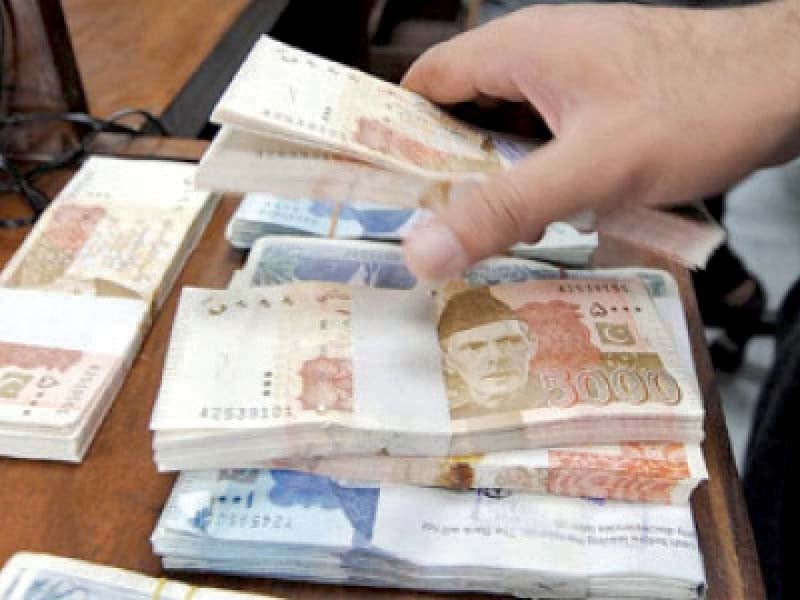
The government’s tax commission has proposed the re-introduction of withholding tax on cash withdrawal and banking transactions and the elimination of hard dollars from the market aimed at broadening an extremely narrow tax base.
Government sources said that the Federal Board of Revenue (FBR) was actively considering recommending the re-imposition of 0.6% tax on cash withdrawal, banking instruments and banking transactions with effect from July this year.
But both the proposals given by the Reform and Revenue Mobilisation Commission (RRMC), led by Ashfaq Tola, appear to be self-contradictory.
The tax on cash withdrawal by non-filers of tax returns may encourage the expansion of informal economy as people in the past have successfully kept cash outside of the banking system.
RRMC proposed that the government should examine how to reduce the circulation of cash and at least eliminate the hard dollar cash in the country. The idea is to end the dollar transactions of foreign exchange companies and hand over the foreign currency business to commercial banks, which will document these transactions.
Except for giving cash in dollars to the outgoing passengers at airports, which can be handled at airport counters, all transactions in foreign currency should be through the banking system, according to a report prepared by the RRMC.
Pakistan’s tax system remains weak with fragile administration. There are 7.6 million people registered with the FBR but only 3.6 million file tax returns, speaking volumes about the inefficiency of the tax system.
Foreign exchange companies are playing a role in bringing dollars in and out of the country but some of them have been found involved in money laundering in the past.
Sources revealed that the imposition of withholding tax on banking transactions and cash withdrawal was on the government agenda for the next budget and its hands “have been strengthened by the RRMC report.”
Many withholding tax provisions had been eliminated in the past, particularly the withholding tax on cash withdrawal, banking instruments and banking transactions other than cash. Consequently, the contribution of withholding tax to direct taxes was reduced, according to the report.
Read Understanding bank run, consequences for economy
However, RRMC recommended that the withholding tax on cash withdrawal, other banking instruments and banking transactions should be restored for non-filers of tax returns.
Except for 3.6 million people and companies, everyone in Pakistan having a population of 246 million is a non-filer of income tax returns.
RRMC believed that the restoration of withholding tax would provide actionable information about non-filers, who cause revenue loss to the country. However, in the past, the FBR could not utilise the information when the tax had been in place for more than six years.
The government had also attempted to restore the tax on cash withdrawal in February this year but it met with strong resistance from the International Monetary Fund (IMF) and the World Bank.
Pakistan and the IMF have not been able to strike a staff-level agreement on the completion of ninth review of the loan programme. The friction in relations may allow the government to press ahead with its plans to impose the withholding tax again.
The government has also not yet accepted the IMF’s demand to discuss the next fiscal year’s budget as the finance ministry is of the view that the budget cannot be linked with approval of only the ninth review.
However, the re-imposition of withholding tax may undermine the World Bank’s $450 million budget support loan, which Pakistan is desperately trying to get to arrange some funds amid dwindling foreign exchange reserves.
Measures such as the tax on cash withdrawal or deposits are regressive in nature and are contrary to the principle of equitable and fair taxation.
The 0.6% withholding tax on deposits can also lead to an increase in the currency in circulation. As of end-December 2022, total banking system deposits had been around Rs22.5 trillion, according to the SBP’s statistics. These include Rs10.5 trillion in personal deposits held by salaried persons, businessmen and others.
It seems that the primary focus is to increase tax collection at the expense of huge implications for various sectors of the economy.
Published in The Express Tribune, May 16th, 2023.
Like Business on Facebook, follow @TribuneBiz on Twitter to stay informed and join in the conversation.

1724760612-0/Untitled-design-(12)1724760612-0-405x300.webp)
















COMMENTS (31)
Comments are moderated and generally will be posted if they are on-topic and not abusive.
For more information, please see our Comments FAQ